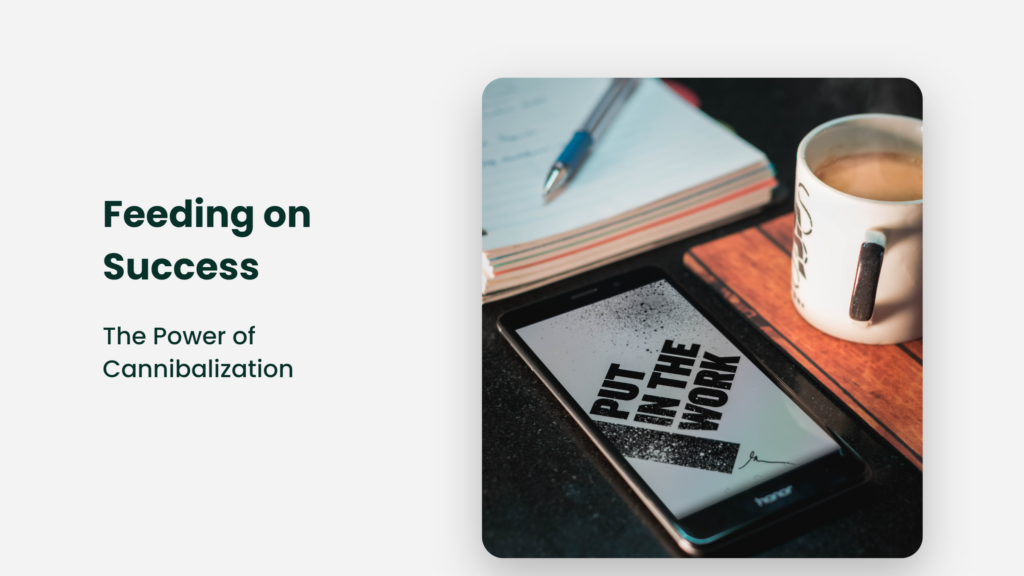
“Sometimes, when you innovate, you make mistakes. It is best to admit them quickly and get on with improving your other innovations.” – Steve Jobs.
Cannibalization: A word that might send shivers down your spine, conjuring up images of a remote island tribe feasting on human flesh. But fear not, dear reader. This isn’t the tale of a bloodthirsty, prehistoric ritual. Instead, it’s the story of a robust business strategy that, when harnessed correctly, can transform industries and breathe new life into stagnating companies.
The Circle of (Business) Life

Before we dive into the wild world of cannibalization business, let’s take a moment to define our terms. In business, existing a company’s market share cannibalization refers to a situation where a new product line, service, or strategy eats away at the sales or market share of an existing one. While it may initially sound counterproductive, this process can lead to more incredible innovation and sales growth in the long run.
Take Apple, for example. The tech giant has a storied history of cannibalizing its own sales products. The iPhone, arguably the most revolutionary device in the company’s lineup, cannibalized the sales of the iPod, Apple’s previous cash cow. And yet, without that act of self-destruction, we may never have experienced the explosive growth of smartphones and the myriad of apps that have changed our daily lives.
The Cannibalization Conundrum
But how do you know when to feast on your existing products? To illustrate, imagine you’re the proud owner of a bustling bakery famous for its delicious apple pies. One day, you are inspired and decide to introduce a new, irresistible cinnamon roll to your menu.
At first, the cinnamon rolls are a hit, and same customers flock to your store to sample the sweet, sticky treats. However, you notice that sales volume of your apple pies have taken a significant hit. The question is: Do you let the sales revenue from cinnamon rolls cannibalize your pie sales, or do you pull them from the menu and return to your tried-and-true apple pies?
An Appetite for Innovation

The answer, as with many things in life, is nuanced. It depends on the potential long-term benefits of the lost sales of the new product, the willingness of your customer base to adapt, and the ability of your company to evolve and innovate. In the case of Apple, the iPhone represented a seismic shift in consumer technology, and the potential benefits far outweighed the risks of cannibalizing iPod sales.
To decide if product cannibalization is right for your business, consider the following questions:
- Does the new product or service potentially revolutionize your industry or significantly grow your market share?
- Can your company sustain itself during the transitional period?
- Are you willing to risk short-term losses for potential long-term gains?
If the answer to these questions is a resounding “yes,” then it may be time to take a page out of Apple’s playbook and embrace the art of cannibalization.
A Feast for Thought
Now that we’ve explored the concept of market cannibalization let’s delve into some real-world examples of businesses that have successfully employed this marketing strategy.

Netflix: The popular streaming service began its journey as a DVD rental company, mailing physical discs to customers across the United States. But as technology advanced, Netflix cannibalized its own DVD rental business to focus on streaming, a move that not only cemented its position as an industry leader but also contributed to the decline of the brick-and-mortar video rental industry.
Feeding on Success: The Power of Cannibalization

Coca-Cola: In response to shifting consumer preferences and increased demand for healthier beverage options, Coca-Cola boldly introduced Coke Zero. This new product cannibalized sales of the original Coca-Cola and Diet Coke. Still, it also allowed the company to capture a new market segment and maintain its position as a global beverage market leader.
The Great Cannibalization Debate

Now that we’ve seen cannibalization in action, it’s time to engage in a hypothetical conversation with two business experts, each offering their perspective on this controversial strategy:
Expert A: Cannibalization is a crucial component of business growth. By introducing new products and services that compete with existing ones, a company can stay ahead of the competition, foster innovation, attract more and adapt to changing consumer needs.
Expert B: While cannibalization can lead to innovation, it also comes with significant risks. A company must weigh the potential benefits prevent market cannibalization against the possibility of alienating loyal customers, disrupting established revenue streams, and destabilizing the organization.
Expert A: True, but stagnation can be just as dangerous. Companies and brands that refuse to evolve risk losing market share and relevance as consumers flock to more innovative competitors.
Expert B: Agreed, but the key is balance. Companies must carefully consider the potential consequences of cannibalization and pursue it strategically rather than recklessly.
A Fine (Cannibal) Dining Experience
A Fine (Cannibal) Dining Experience
So, how can your business embrace cannibalization without biting off more than it can chew? Here are a few tips to help you navigate this delicate process:
- Conduct thorough market research: Before introducing a new product or service that could cannibalize your existing offerings, gather data on consumer preferences, industry trends, and potential competitors. This will help you decide whether the risks of cannibalization are worth the potential rewards.
- Please communicate with your new customers: Engage with your customer base and solicit their feedback on your new offerings. By involving them in decision-making, you can minimize the risk of alienating loyal customers and ensure that your innovations align with their needs and desires.
- Prepare for the transitional period: Embracing cannibalization often involves a period of adjustment as your company adapts to new products, services, or strategies. Be prepared for potential short-term losses and ensure you have the necessary resources and infrastructure to support your long-term vision.
Frequently Asked Questions
Q: Is cannibalization always a bad thing?
A: Not necessarily. While it can be risky, cannibalization can lead to innovation, growth, and increased market share when strategically approached.
Q: How do I know if cannibalization is right for my business?
A: Consider factors such as the potential benefits of the new product or service, your company’s ability to adapt, and the willingness of your customer base to embrace change.
Q: Can cannibalization be avoided?
A: In some cases, it may be possible to avoid cannibalization by carefully managing your existing product portfolio or pursuing complementary strategies. However, balancing protecting existing revenue streams and fostering innovation is essential.
In Conclusion
In conclusion, cannibalization is a high-stakes game that can make or break a business. By understanding its nuances, considering the potential risks and rewards, and approaching it strategically, companies can harness the power of cannibalization to drive innovation, capture new market segments, and stay ahead of the competition.
So, whether you’re a budding entrepreneur or a seasoned business executive, remember: Sometimes, to thrive, you must be willing to take a bite out of your success. Bon appétit!




